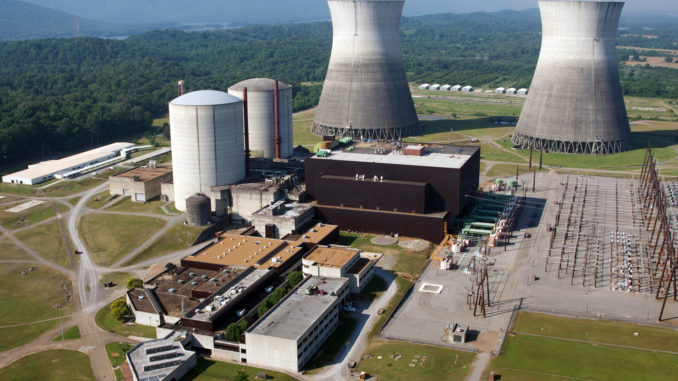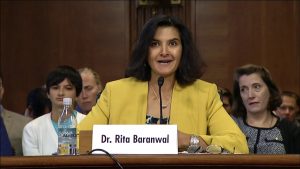
While the United States has the world’s largest and most advanced nuclear power plant industry in the world, it won’t be able to maintain it unless it develops a strategy to promote mining of vital nuclear fuel and lead the way in developing advanced nuclear technologies, a U.S. Energy Department official said Friday.
The comments to a U.S. policy institute from Rita Baranwal, assistant secretary for the U.S. Department of Energy’s Office of Nuclear Energy, mirror recommendations in a recently released report.
“We operate the world’s largest nuclear fleet, but we won’t be able to maintain it without a strategy,” Baranwal told the Atlantic Council in an online presentation. “The rest of the world looks at us as leaders, and we need to maintain that in the international community.”

The report, by a working group established by the White House last year lays out 18 recommendations, starting with a plan to revitalize the uranium mining industry in the U.S.
Uranium is a radioactive metallic chemical element that can be mined from open pits or underground excavations, according to the U.S. Department of Energy. It is the primary fuel source for nuclear power plants and nuclear weapons. Uranium-rich deposits are found in sites around the world, including in the U.S., where it is primarily mined from locations in southwestern states that include Wyoming, New Mexico and Texas.
Some of the report’s urgency is fueled by concerns that the U.S. nuclear industry is falling behind Russia, China and other rival world powers, and its primary recommendation is to establish a national uranium reserve that is to be stocked by direct purchases of uranium by the federal government.
The idea was first proposed in February with the administration’s release of its 2021 budget request, which included funding the uranium reserve for 10 years at a total cost of $1.5 billion.
Several of the recommendations address foreign uranium production, which the report said has been manipulated by foreign state-owned enterprises to establish dominant market positions, specifically citing Russian market interference.
“By undercutting U.S. and other foreign alternatives, Russia has become a major enrichment supplier to domestic U.S. nuclear reactor operators. Following a deliberate strategy, Russian suppliers have aggressively targeted the U.S. market for several decades,” the report said.
It highlights a decline in U.S. nuclear power production capabilities, noting that eight nuclear plants have closed since 2013, with the most recent being Pennsylvania’s Three Mile Island in September. That plant was the site of 1979 accident that permanently closed one of the station’s two nuclear reactors, sparking a wave of nuclear power plant opposition that has carried forth to the present.
“We appreciate continued attention to the economic challenges facing the existing nuclear fleet. However, more actions should be taken to preserve the plants operating today, and we will continue to work with Congress to ensure the industry is included in legislative proposals for tax credits and other incentives to the energy sector,” said Maria Korsnick, president and chief executive officer at the Nuclear Energy Institute, in a statement.
The report noted nuclear power faces increased competition in domestic energy markets from a combination of state subsidies, renewable power and increased natural gas production, along with stagnant demand on the domestic power grid.
The Atlantic Council, a Washington-based think tank, has issued several studies on the nation’s nuclear industry, including two 2019 reports that mirrored some of the Energy Department’s findings, including one that laid out the issues with foreign competition.
The U.S. is still one the top users of nuclear power, with 96 operating reactors, ahead of China at 48 and Russia at 38, according to the Nuclear Energy Institute. Of the 52 reactors under construction around the world, only two new reactors are in the U.S., while China is building 12.
“Russia and China today are building more than 60 percent of new nuclear plants under construction worldwide, while the United States is plagued by continuing difficulties in building new plants,” the Atlantic Council report stated. “Additionally, the US nuclear industry faces supply chain atrophy, financial difficulties of leading US nuclear energy companies, and a long-disempowered Export-Import Bank. Given this juxtaposition of circumstances, the international credibility of the United States in nuclear power is in question.”
Jennifer T. Gordon, managing editor and senior fellow at the Atlantic Council, said the reports “track closely,” however, a bipartisan group established by the think tank was at odds over the Energy Department’s primary conclusion of establishing a federal support system for uranium mining.
“We were unable to come to a conclusion on domestic uranium mining,” Gordon said. “To keep costs down for utilities, it may be better to import uranium.”
The report’s goals of promoting nuclear power, including developing new, more efficient types of reactors, is also already under way, Baranwal said.
“Many different new reactor types are being developed and designed, and some have already started the licensing process both here and internationally,” she said. “Many states and countries have set for themselves carbon emission goals. Nuclear power is emissions free. We are at a time where we can leverage that feature as an asset.”
The National Mining Association said that the organization has for years voiced concerns about U.S. reliance on foreign uranium suppliers, as well as domestic policies that hamper U.S. nuclear projects. The organization said the administration’s recommendations are “common-sense” proposals to address U.S. reliance on foreign uranium imports.
(Editing by Bryan Wilkes and Allison Elyse Gualtieri.)
The post Trump administration moves to bolster nuclear power industry appeared first on Zenger News.
